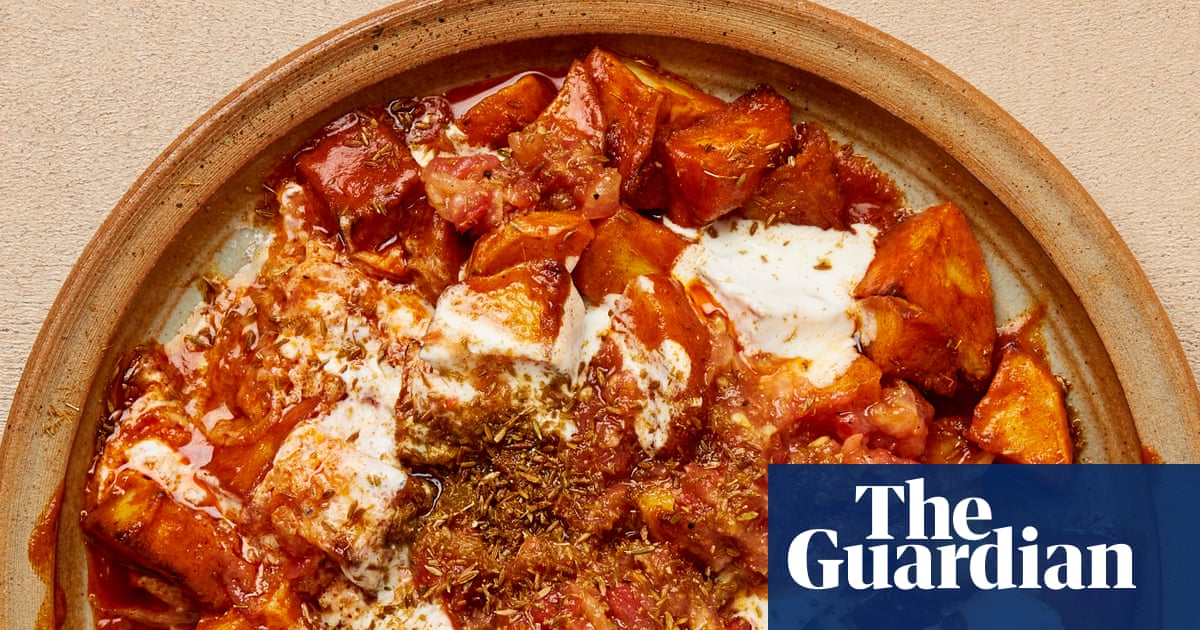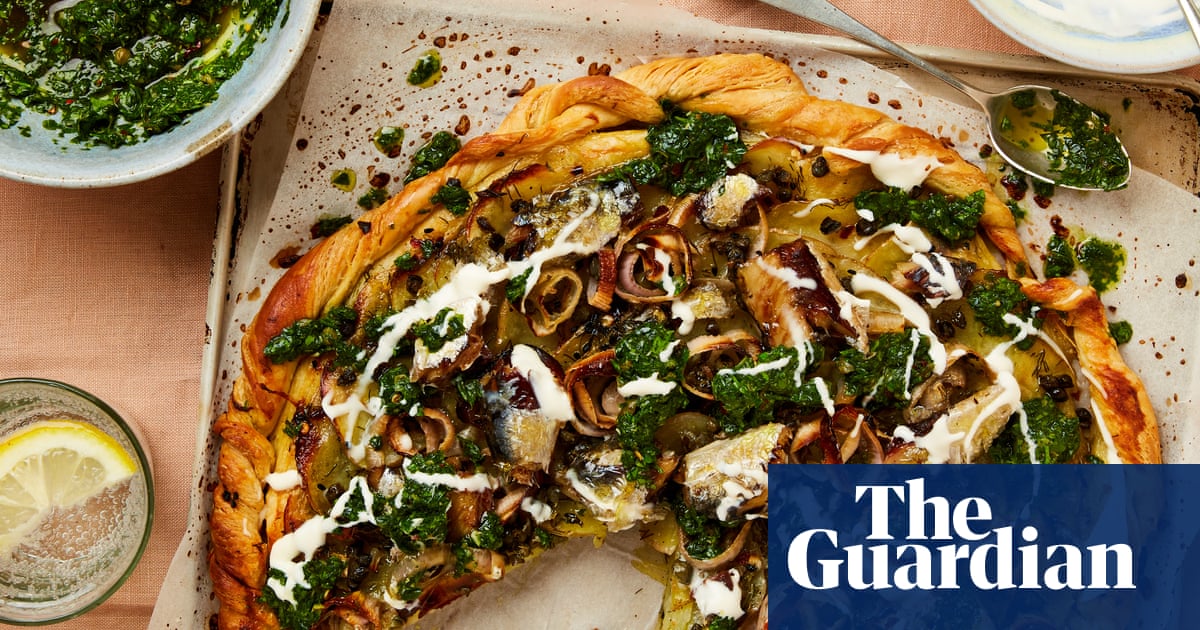
The traditional Spanish way of eating, with all its little dishes to share and small bites often eaten by hand, is my idea of heaven. As with Middle Eastern meze, which is the style of food I grew up with, it’s synonymous with everything I love about food and eating: the energy generated simply by having a range of dishes that need to be passed around, for example, and the way that a meal never really “ends” (unlike when everyone has their own individual plate of food). Add a whole load of olive oil, garlicky mayonnaise, cubes of potato, lemon juice, quickly fried prawns and fresh tomato, and, really, what more could you ask for?
Patatas bravas with grated tomato and cumin (pictured top)
Is there a dish more synonymous with tapas than patatas bravas? It’s cooked in all sorts of ways all over Spain, and I was intrigued to learn that, traditionally, bravas sauce does not contain tomato at all, and is instead a thick, fiery paprika sauce. Even so, I love the freshness that grated tomato brings to proceedings. Most potato varieties will work well but I prefer a slightly waxy one, such as yukon gold.
Prep 10 min
Cook 40 min
Serves 4
800g yukon gold potatoes, or another waxy variety, peeled and cut into 3cm pieces
75ml olive oil
Fine sea salt and black pepper
3 plum tomatoes (320g)
1 garlic clove, peeled and crushed
¾ tsp plain flour
2 tsp sweet smoked paprika
1 tsp hot smoked paprika
1 tsp cumin seeds, toasted and lightly crushed in a mortar
60ml plain yoghurt, at room temperature
Heat the oven to 200C (180C fan)/390F/gas 6. Toss the potatoes, two tablespoons of oil and three-quarters of a teaspoon of salt on a large lined baking sheet, then roast for 30 minutes, until golden and cooked through.
Meanwhile, grate the tomatoes on the rough side of a box grater, then discard the spent skins; you should end up with about 220g grated flesh. Transfer the grated tomato to a sieve set over a bowl and season the pulp with the garlic and a half-teaspoon of salt. Leave to drain for five minutes, stirring once or twice, then transfer the pulp to a second bowl and season with two tablespoons of oil and a good crack of pepper. Measure the tomato liquid, top up to 175ml with cold water, then set aside.
For the bravas sauce, put the flour and the remaining tablespoon of oil in a small pan on a medium-high heat and cook, stirring, for a minute, until it turns into a bubbling paste. Stir in both paprikas, cook for another 30 seconds, until fragrant but not burnt, then slowly stir in the tomato water. Simmer until the sauce reduces to a thick, double cream-like consistency.
Transfer the oven-hot potatoes and the bravas sauce to a large bowl, and toss to combine. Layer the potatoes on a medium platter, spoon the yoghurt, tomato pulp and cumin on top and serve at once.
Prawn tortillitas with dipping vinegar
In Spain, these frilly fritters would normally be made with whole shell-on shrimp, which make for the crispiest results, but they’re quite hard to get hold of in the UK, so we’ve used a mixture of prawns and brown shrimp instead.
Prep 15 min
Cook 20 min
Serves 4
75g plain flour
75g chickpea flour
300ml fridge-cold sparkling water
100g raw shelled prawns, deveined and finely chopped
50g raw brown shrimp
2 garlic cloves, peeled and crushed
1 red onion (110g), peeled and finely chopped
30g fresh coriander, finely chopped
1 tsp coriander seeds, roughly crushed in a mortar
Fine sea salt
600ml sunflower or vegetable oil
For the dipping vinegar
45ml white-wine vinegar
45ml water
1 red chilli (10g), finely chopped
1 tsp caster sugar
First, make the batter. Sieve the two flours into a large bowl and mix well. Stirring constantly, slowly pour in the sparkling water to make a smooth batter, then stir in the prawns, shrimp, garlic, all but 30g of the chopped red onion, 20g of the chopped coriander, all the crushed coriander seeds and half a teaspoon of salt. Cover the bowl with a plate, then set aside to rest for half an hour.
Meanwhile, make the dipping vinegar. Put the remaining 30g chopped onion in a small bowl, add the vinegar, water, chilli, sugar and three-quarters of a teaspoon of salt, mix well and set aside.
To fry the tortillitas, put the oil in a large, high-sided frying pan on a medium-high heat. Once it’s good and hot, mix the batter well, then ladle 90-100g of it into the centre of the pan in a 10cm-diameter circle – it should sizzle immediately and go frilly at the edges, but stay slightly thicker in the middle. Fry for two to three minutes, until golden underneath, then, using two heatproof spatulas, carefully flip over and cook for another minute or two on the other side, until that, too, is slightly golden – take care not to over-fry the tortillita, otherwise the frills might catch and burn. Lift out of the hot oil and on to a plate lined with kitchen paper to drain, then repeat with the remaining batter until it’s all used up.
Stir the remaining 10g chopped coriander into the vinegar mix and serve alongside the hot tortillitas for dipping.
Chorizo, cider and chickpea stew with ajillo
The Asturias region of northern Spain has a long history of producing a cider known as sidra, which is not at all sweet. We used Cornish cider as a substitute, but you can use any variety that you have open and/or like to drink. This dish is very quick to put together, so it’s great for a midweek meal or as part of a tapas spread. We used jarred chickpeas, because they’re more tender than tinned; if using tinned, simmer in boiling water for 10 minutes beforehand, until tender. Serve with crusty bread.
Prep 15 min
Cook 15 min
Serves 2
1 tsp olive oil
4 raw/cooking chorizo (200g), cut at an angle into 1cm-thick slices
4 garlic cloves, peeled and crushed
1 tbsp picked thyme leaves
¼ tsp paprika
150ml cider
400g drained cooked chickpeas, preferably from a jar
Fine sea salt and black pepper
Good-quality garlic mayonnaise, to serve
For the ajillo
10g parsley, very finely chopped
2 tbsp olive oil
1 garlic clove, peeled and crushed
1 tbsp lemon juice
Put the oil and chorizo in a medium saute pan on a medium-high heat and fry for six minutes, flipping once halfway, until the fat renders out and the chorizo develops a crisp crust. Add the garlic, thyme and paprika, cook for a minute more, then pour in the cider and cook for three to four minutes, until the liquid reduces by half. Add the chickpeas, bring to a simmer, cook for two minutes, then grind in a few twists of black pepper, take off the heat and divide between two bowls.
Meanwhile, mix all the ajillo ingredients and a pinch of salt to taste in a small bowl, then swirl some through each bowl of hot stew just before serving with some garlicky mayo on the side.












